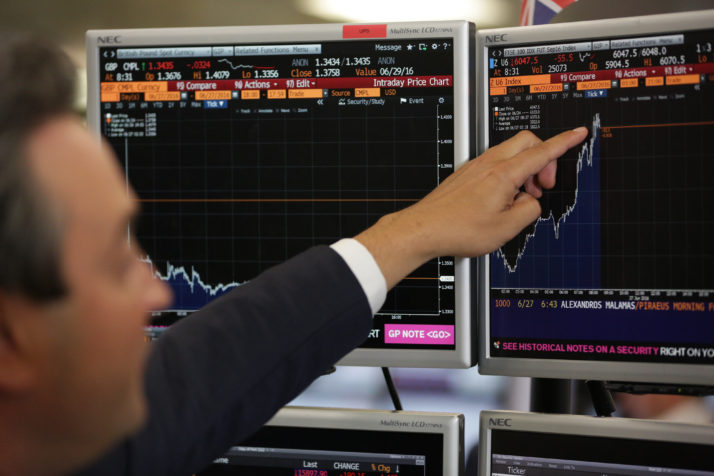European stock markets are plunging at the start of the week following a day of mixed trade in Asia, with Gazprom’s announcement on Friday weighing heavily on the bloc.
A bank holiday in the US often results in relatively quiet trade everywhere else but that’s certainly not looking the case today. The decision not to restart gas flows via Nord Stream 1 after an oil leak was apparently discovered has created enormous uncertainty in Europe going into the winter. The euro slipped to a new 20-year low against the dollar in response to the shutdown.
The decision conveniently came hours after the G7 agreed to an oil price cap and as countries announced they’re ahead of schedule in filling gas reserves. Many would argue it was only a matter of time until the decision was taken, with Europe having been squeezed over a number of months for one reason or another.
There have been reports that Gazprom could increase deliveries via Ukraine as a result of the shutdown but it’s not clear whether this would be enough to offset the loss of Nord Stream 1. And considering Siemens has claimed that such a leak would not ordinarily affect the operation of a turbine and is easily fixed, you have to wonder whether Russia would actually take that decision. A painful winter lies ahead.
A massive job for the incoming UK PM
The UK will discover who its new Prime Minister will be today, with Liz Truss the standout favourite to win the run-off against Rishi Sunak. Whoever is victorious, the job facing them is enormous, with the economy facing a long recession and eye-watering inflation. Alleviating one while not exacerbating the other will be the first job for the incoming Prime Minister and it won’t be easy, to put it mildly. There’s a huge amount of pessimism around the UK at the moment, as evident by the pound, which looks on course to fall to its lowest level since 1985 against the dollar.
Chinese headwinds strengthen
China is also facing numerous headwinds going into the end of the year, with Covid once again creating huge uncertainty. Beijing’s commitment to its zero-Covid policy has created major challenges for the economy this year and with mass testing taking place over the weekend and lockdowns being extended in Chengdu, that’s going to persist.
The pressure is being felt in the yuan which fell for a sixth month in August and is continuing to fall against the dollar. That’s despite the best efforts of the PBOC which continues to set the yuan fix stronger than markets expect.
To make matters worse, US President Biden is reportedly weighing up measures to limit US investment in Chinese tech firms. The US is becoming increasingly hawkish toward China and the latest move is another blow to its tech space.
OPEC+ meets after price cap announcement
Today’s OPEC+ meeting has been somewhat overshadowed by all the talk of oil price caps and Nord Stream 1. The group is expected to leave output targets unchanged but it’s likely that a cut will be at least discussed which, if followed through on, would create more volatility and uncertainty at a time of considerable unease. The economic outlook and potential for a new nuclear deal have weighed on prices recently, much to the frustration of Saudi Arabia in particular.
An output cut won’t make them any friends at a time when the world is facing a cost-of-living crisis already and the group has failed to keep up with demand this year. The more sensible option may be to hold this month and revisit in the future when there’s more clarity; something that is seriously lacking at this moment in time.
Gold holding up for now
Gold is treading water at the start of the week even as the dollar rallies strongly once more. Traders are favouring the safety of the greenback this morning but that’s not damaging appeal for the yellow metal. It’s come under considerable pressure in recent weeks as yields have risen and the dollar has bounced back and it’s now trading around a key area of support, which may be why we’re seeing more resilience.
While $1,700 looks like a psychological barrier, $1,680 is key. A break of that could signal further pressure on gold, especially if accompanied by more aggressive tightening from central banks.
Major support being tested
Bitcoin is continuing to show resilience around $20,000 but that’s really being put to the test as risk aversion sweeps through the markets once more. It’s down 1% so far today and trading a little below that crucial support level. A significant break at this point could be really damaging, with the following key level below here being the June lows around $17,500. Considering the outlook for risk appetite in the near term, it’s not looking good.

 Forex3 weeks ago
Forex3 weeks ago


 Naira2 weeks ago
Naira2 weeks ago
 Billionaire Watch2 weeks ago
Billionaire Watch2 weeks ago




 Naira2 weeks ago
Naira2 weeks ago




 Naira2 weeks ago
Naira2 weeks ago




 Naira1 week ago
Naira1 week ago




 Naira3 weeks ago
Naira3 weeks ago




 Naira4 weeks ago
Naira4 weeks ago




















